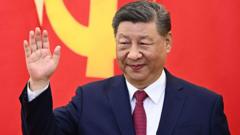In a significant visit to Vietnam, President Xi Jinping remarked on the necessity for Vietnam to oppose "unilateral bullying" while promoting a respectful, rules-based global trade system. His comments, delivered during a regional charm offensive across Southeast Asia, highlight the escalating tensions between the U.S. and China, particularly in the realm of trade.
**Xi Jinping Advocates for Vietnam to Stand Against "Unilateral Bullying" Amid Trade Tensions**

**Xi Jinping Advocates for Vietnam to Stand Against "Unilateral Bullying" Amid Trade Tensions**
Chinese President Xi Jinping urges Vietnam to resist economic pressures in a delicate geopolitical climate, coinciding with ongoing U.S.-China trade disputes.
Xi's visit comes at a critical juncture as the U.S. imposes hefty tariffs on Chinese goods, resulting in retaliatory measures from China. In his discussions with Vietnam's Communist Party Secretary-General To Lam, Xi articulated the importance of maintaining stability in the global trade structure and reinforcing supply chains amidst unilateral actions by powerful nations.
While Xi refrained from directly naming the U.S. during these discussions, his comments were seen as strategic positioning against U.S. President Donald Trump's aggressive tariff policies. Trump characterized Xi's overtures to Vietnam as tactical maneuvers aimed at undermining American interests, highlighting the complexity of alliances in Asia.
Beneath the surface of these statements lies a nuanced balance. Experts note Vietnam's careful navigation between its ties with China and its more substantial relations with the U.S. While Xi sought to frame China as a dependable partner, Vietnam remains cognizant of its strategic alliances, particularly with the U.S., essential for its economic interests.
As Xi concludes his visit in Vietnam and prepares to meet leaders in Malaysia, the overarching narrative appears to emphasize China's role as a stabilizing force in Southeast Asia against perceived threats of trade protectionism from the U.S. This ongoing dialogue underscores the evolving dynamics in global trade and alliances, with implications for regional security and economic policies.
While Xi refrained from directly naming the U.S. during these discussions, his comments were seen as strategic positioning against U.S. President Donald Trump's aggressive tariff policies. Trump characterized Xi's overtures to Vietnam as tactical maneuvers aimed at undermining American interests, highlighting the complexity of alliances in Asia.
Beneath the surface of these statements lies a nuanced balance. Experts note Vietnam's careful navigation between its ties with China and its more substantial relations with the U.S. While Xi sought to frame China as a dependable partner, Vietnam remains cognizant of its strategic alliances, particularly with the U.S., essential for its economic interests.
As Xi concludes his visit in Vietnam and prepares to meet leaders in Malaysia, the overarching narrative appears to emphasize China's role as a stabilizing force in Southeast Asia against perceived threats of trade protectionism from the U.S. This ongoing dialogue underscores the evolving dynamics in global trade and alliances, with implications for regional security and economic policies.





















